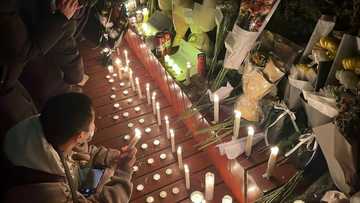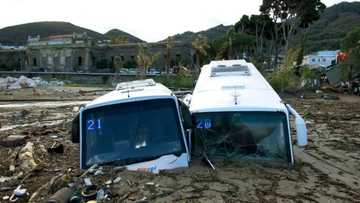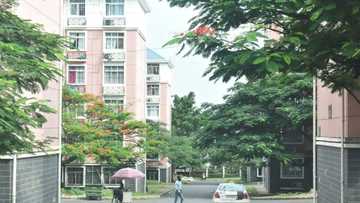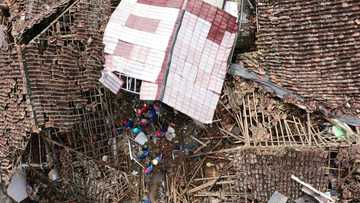Beyond Barriers: How NGO is Raising Stars in Girl Child from Neglected Slum Communities in Lagos
Like a sunflower in autumn, Chinomso Okeke’s melanin-adorned face beamed as she sat down in the car, giggling in relish and enjoying the breeze oozing from the motor’s air conditioner. In her mind were bubbles of dreams and passion — and the bigger motivation to ignite them.
In the Makoko community where she was born 13 years ago into an expanding family of seven — a father who is a night shift guard and a mum who sells alcohol to support her five children —she was not meant to be a “good child.”
Every day, she woke up to the rackety sound of the marketplaces, the rippling of water, the terrible smell of cigarettes and refuse, and the sight of young girls roaming around the street and waterways with boys, probably ending up a menace. Like any girl raised in a Makoko slum, the odds were against her.
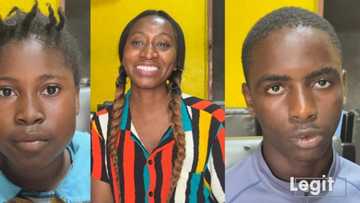
Read also
Bridging the gap: How NGO is addressing low-quality education in Ajegunle slum with library for kids
Makoko slum, an informal community across the Third Mainland Bridge located on the coast of mainland Lagos, is largely harboured by the Egun people, whose main occupation is fishing.
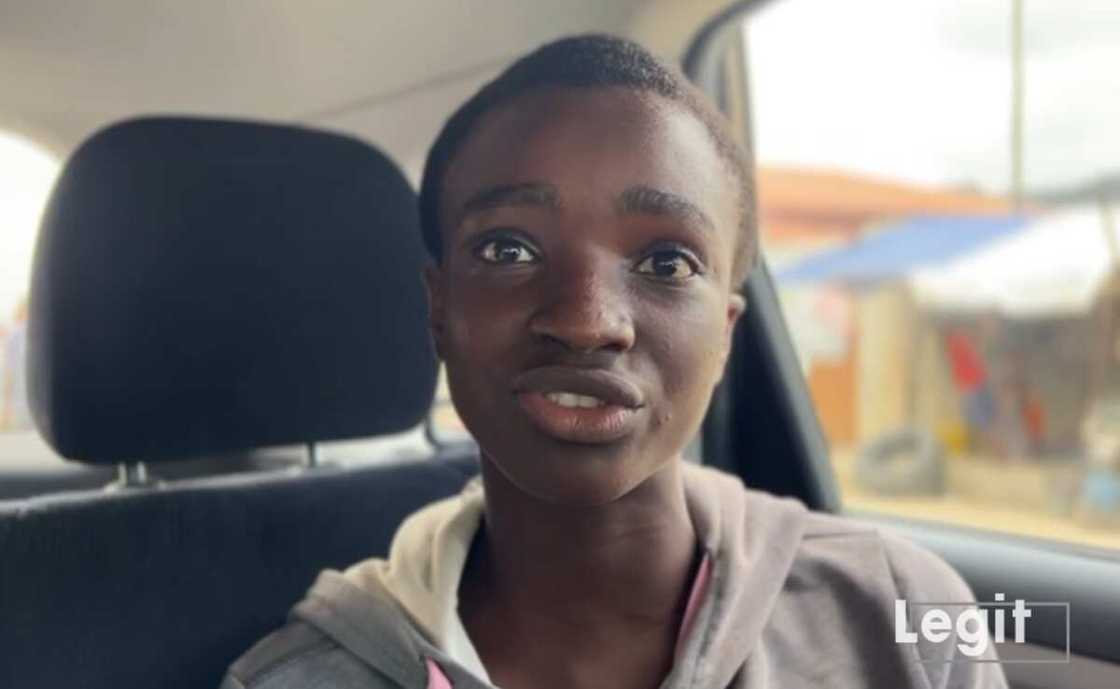
Source: Original
Often eulogised as the “Venice of Africa” owing to its waterways, this chaotic floating district built on stilts along the lagoon is home to a large population estimated to be as high as 100,000.
PAY ATTENTION: Сheck out news that is picked exactly for YOU ➡️ find the “Recommended for you” block on the home page and enjoy!
For a girl child like Chinomso born in Makoko, the choice to be a dreamer is always delimited. She could have been another target of early marriage and ended up breeding kids and selling alcohol like her mother while jeopardising her education in the process.
Home is mouth of a shark
Like Chinomso, Titilope Ajimuda was also born and bred in the Makoko community to a father who is a civil servant and a mum who is a petty trader. Her parents left home as early as 6:30 am and returned late at night. This means within this period of their absence, the kids were left alone to look after themselves.
According to the 23-year-old, children raised in Makoko are bound to be victims of circumstances. Apart from social vices, which are rampant, young girls are handed off in marriage while boys are easily trapped by the temptation of bad influences.
“I would have been a mother of three by now,” she said. “Growing up in a slum like this where you were exposed to a lot of social vices, we’re left to look after ourselves.”
The same fate was of Aminah who was born and raised at the Monkey Village, a neglected and now demolished slum heavily characterised by a stinking smell of a mountainous refuse dump which is located near the Opebi link bridge in the state’s capital Ikeja.
She did not have an uneasy upbringing as her father, Daud, left home when she was young and never returned. Her fate, and of her siblings, hangs on their mother, Fati, who feeds the family with meagre income from her food business.
Aminah who spoke in Pidgin told Legit.ng that she did not start school early because her family was incapacitated to afford education for her and her siblings at the same time. But now in primary four, the young girl had to make sacrifices by allowing his siblings to go to school first.
“My mum is the one solely responsible for our needs. From feeding to other things, she is the one catering for our needs since my father left. I did not start school in time because my mum was not financially buoyant to send me to one. One day, I told her to allow my junior be enrolled in school first. So my three brothers started early before I finally did,” she said.
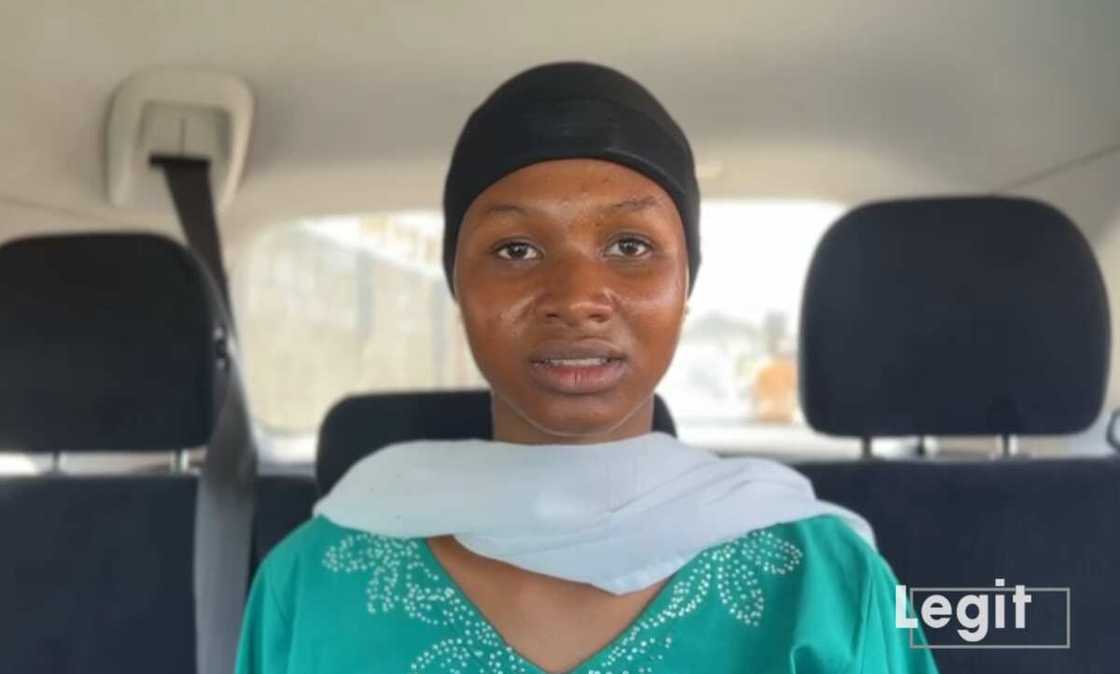
Source: Original
Beyond Makoko and Monkey Village: Spotlighting challenge of child education, child marriage in Nigeria
According to the United Nations International Children's Emergency Fund (UNICEF), child marriage is “any formal marriage or informal union between a child under the age of 18 and an adult or another child.”
Described as a violation of fundamental human rights, the problem of child marriage is not only peculiar to Makoko settlement as UNICEF projected that before the COVID-19 pandemic, more than 100 million girls “were expected to marry before their eighteenth birthday in the next decade” across the world.
However, there is a prevalence of child marriage practice in Nigeria— more than in many countries in West Africa, as shown in a report by the United Nations (UN) agency, even though the federal Child Rights Act (CRA, 2003) prohibits marriage below the age of 18.
Organisations and different human rights bodies, including the Human Rights Watch (HRW), have raised eyebrows against the practice, describing it as a disturbing violation of Girls' rights.
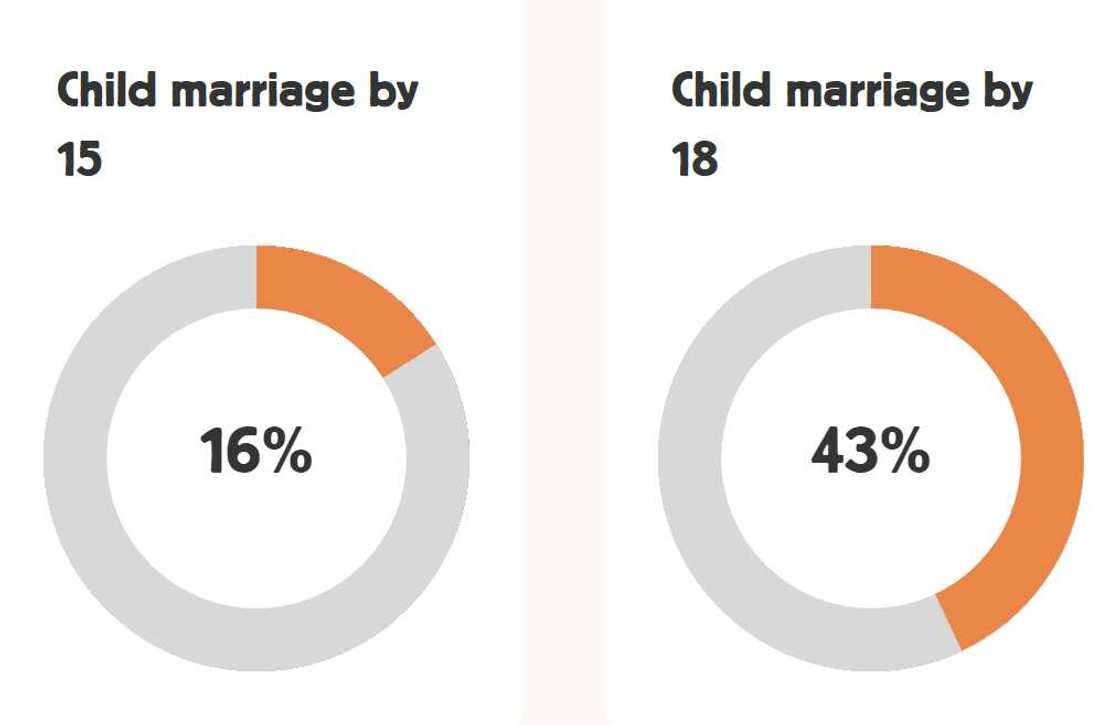
Source: UGC
By consequence, UNICEF said the archaic practice is capable of threatening “the lives, well-being and futures of girls around the world”, just as the Nigerian Health Watch (NHW) described it as “a challenging public health dilema.”
*******
Without any iota of doubt, another issue the girl child faces is lack of educational support. UNICEF said one in every five of the world’s out-of-school children is in Nigeria, even though primary education is officially free and compulsory.
In a recent report, the child rights-focused organisation labelled Nigeria as the epicentre of out-of-school children in the world, with the figure estimated to be 10.5 million as of the Quater one (Q1) of 2022.
According to the Malala Foundation, girls account for 60% of Nigeria’s 10 million out-of-school children, while “30% of girls aged 9-12 have never been to school” at all. It further highlighted barriers such as child marriage, poverty and discriminatory social norms as some of the challenges faced by the girl child in Nigeria.
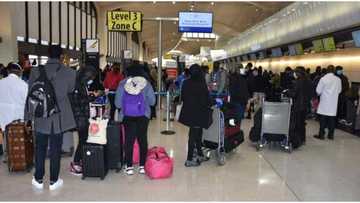
Read also
Japa: What young Nigerians should consider before travelling to US, UK, other countries, RCCG Pastor Opens up
Geography, beliefs, poverty and gender inequality have been fingered as some of the factors responsible for Nigeria's low girl child education.
Dare to dream: Responding to the challenge of Girl Child education and early marriage in the slum through CEE-HOPE
Against the backlog of challenges facing the girl child in the slums, a non-profit Centre for Children's Health Education, Orientation and Protection (CEE-HOPE) began works on the rights, education, and skills development of vulnerable children and young people in impoverished and marginalised communities including urban slum settlements, impoverished rural communities, etc.
With its two centres in Lagos, the foundation has raised many geniuses from the Makoko slum and Monkey Village, including running a shelter for abused women and girls through its wing, the Hearts of Hope Shelter.
Prominent among the stars raised by the organisation is Aisha Saleh, a 17-year-old leading child's rights activist. She personifies diamonds found in the slums.
Aisha, who lost her mother at a young age, was the leader of the girl's club in her community and CEE-HOPE's Youth Hub and ICT Centre coordinator. She has used her position to fight child marriage.
As CEE-HOPE's Period Poverty Ambassador, she campaigns for the distribution of free sanitary products for school girls by the Nigerian government as currently done by many governments around the world. She is very outspoken against injustice against the urban poor.
Just like Aisha Saleh, a ray of hope flashed into Chinomso’s juvenile world after CEE-HOPE came to her community in Makoko, and everything changed for the better.
“I was sleeping when my friend came and knocked at our door and said ‘they don come, that woman that used to help girls and share things for girls’,” Chinomso told Legit.ng on meeting Betty Abah, a Nigerian journalist, women and children's rights activist who is the founder of CEE-HOPE.
“She (Abah) was explaining to us about rape and early child marriage in our community. She said we should stop these practices, including bullying. She told us that if they force us into early marriage, we should go and report to an elder. That was how she started working with me (and other girls),” she said.
Since discovering her as a stellar star, CEE-HOPE did not only ensure that Chinomso is back at school but she is also equipped with the perfect orientation and mentality she needs to fight abuse and be a strong voice in her community.
Thanks to the organisation, she is now empowered in bag making which she teaches others and also earns from. She has also learned to operate computers at the ICT centres established by the NGO. Through the efforts of the Centre’s founder, Chinomso, who is aspiring to become an actress or footballer, was appointed as a climate change ambassador.
Excited Chinomso told Legit.ng that her life has not remained the same since she was picked by the organisation.
“My life has changed since I met them (CEE-HOPE). I stopped following some bad friends who we went together outside. Now, I am a good child.”
Asked to mention the bad habits she was involved in before meeting the NGO, the 13-year-old said she usually went out and returned late, but the bad influence is now a thing of the past.
“If my mum talked one, I would talk two. Now I obey all she says. I am one of the best children in my community,” she further stated, saying her dream is also to gain admission to Imo State University (IMSU).
For Titilope who is now a student of Guidance and Counselling at the Adekunle Ajasin University, Akungba in Ondo State — a course which she chose against her parents’ law wish because the CEE-HOPE inspired her, her education dream would not have been materialised if not for the NGO.
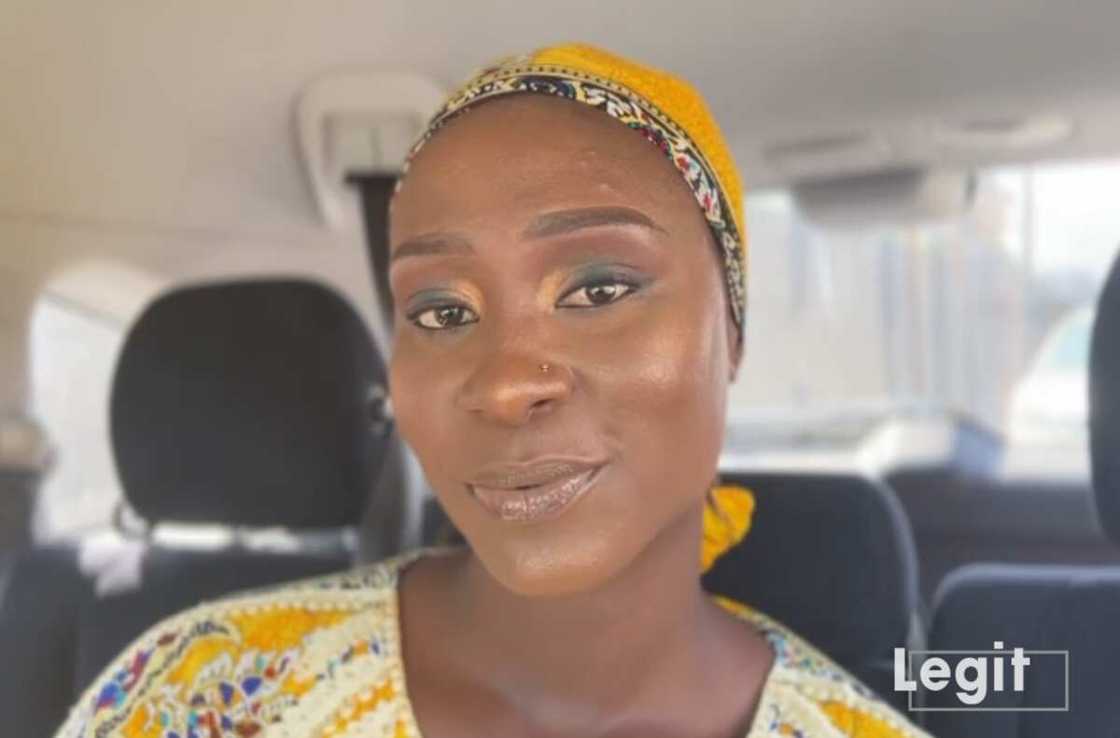
Source: Original
In 2014 when the NGO visited her community, she took up learning in make-up practice which she is now teaching children in the community as a way of “giving back.”
On the impact of the organisation in her life, Titilope who said she could have become a mother of three told Legit.ng:
“The things I gained from CEE-HOPE is the emphasis on the girls’s education. That triggered me to go to school. I have friends who are drops-out. I cannot let Aunty Betty (Abah) down because of the support. Most times, she would call and ask if we needed any thing.”
The 23-year-old also said the teachings from the centres have helped young children, mostly immigrants, to become better as they are not given room to engage in “bad things.”
Fatimah was in Primary 4 when she met Betty Abah’s CEE-HOPE, but her life has been moving forward on the right track. She expressed that the NGO founder’s words of encouragement have made her desist from bad influence.
According to her, she has shunned bad friendships and now obeys her mother’s instructions.
The challenges
Despite its long arms of impacts and willingness to eradicate child marriage and challenges facing girl child education in Nigeria, CEE-HOPE is confronted by the problem of limited resources. The organisation is funded majorly by individual contribution which is hindering its reach.
The founder Betty Abah told Legit.ng that the organisation is currently running a summer school in five states, with each centre having over 200 children. The programme is sponsored by a couple.
“We’ve had some institutional support, but the volume of support from individuals is more than the institutional support we’ve had. Some international donors cannot place our work,” she said.
Abah also added that they (some foreign donors) opine that paying children's school fees and other child responsibilities is the government's responsibility.
“We’re looking for more (help) because the work is actually too much. The more you go into the community, the more need you need to solve. We do not have the resource to do what we would have wanted to do,” she emphasised.
Another problem faced by the NGO is the lack of support from the parents of the children, who often misinterpret the centre’s kindness as extortion of their kids.
Speaking more on this, Abah said there were times parents would call to demand money. Coupled with this, lack of exposure and poor anger management from parents has made some brilliant girls forfeit opportunities that could have sent them abroad for education.
Another major limitation obstructing the centre's efforts is the lack of government support. Abbah argued that people in the slum communities like Makoko and Monkey Village were not considered in the book of government’s mercy.
Citing the demolition of Monkey Village in December 2021, she stated that poor people in some of these marginalised communities which the NGO helps have been rendered homeless and displaced after the demolition.
According to her, the demolition of Monkey Village in Ikeja was without prior notice as the government took caterpillars to the area and brought down the houses of the vulnerable residents of the settlement.
Even the Youth Hub, an ICT/skills development youth engagement centre the CEE-HOPE built for school children as part of its education for all campaign was not saved.
***
This story was produced by Legit.ng in partnership with Nigeria Health Watch through the Solutions Journalism Network, a nonprofit organisation. dedicated to rigorous and compelling reporting about responses to social problems.
Source: Legit.ng

Nurudeen Lawal (Head of Politics and Current Affairs Desk) Nurudeen Lawal is an AFP-certified journalist with a wealth of experience spanning over 8 years. He received his B/Arts degree in Literature-in-English from OAU. Lawal is the Head of the Politics/CA Desk at Legit.ng, where he applies his expertise to provide incisive coverage of events. He was named the Political Desk Head of the Year (Nigeria Media Nite-Out Award 2023). He is also a certified fact-checker (Dubawa fellowship, 2020). Contact him at lawal.nurudeen@corp.legit.ng or +2347057737768.

Rahaman Abiola (Editor-in-Chief) Rahaman Abiola is an award-winning journalist and Editor-in-Chief with over 8-year experience. He holds a degree in English & Literature from Obafemi Awolowo University, Nigeria (2015). He's a recipient of the Mile Media Award, Kwame Karikari Fellowship. His works have appeared in Punch, The Nation, Tribune, The Cable, Sahara Reporters and others. rahaman.abiola@corp.legit.ng





